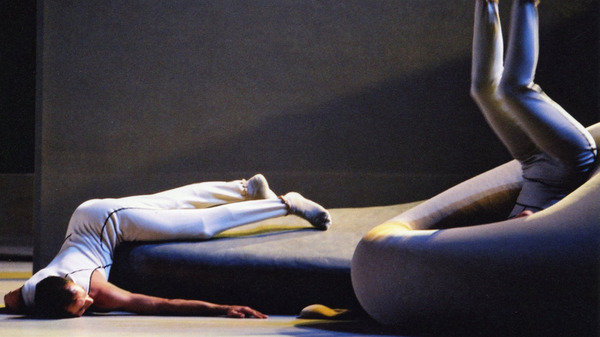Videodanse + Charles de Meaux
dal 18/2/2014 al 9/3/2014
Segnalato da
18/2/2014
Videodanse + Charles de Meaux
Centre Pompidou, Paris
Oublier la danse: choreographers, performers, historians and dance critics open each daily film-show session: living speakers testifying to an active memory. For the Centre Pompidou New Festival, Charles de Meaux has dreamed up a journey through the depths of "Beaubourg", imagining that one of the pipes comes up into Forum -1 and invites visitors to explore it.

A Nouveau festival / Videodanse
Forget dance - Oublier la danse
This profoundly reworked edition of Vidéodanse, entitled "Oublier la danse" is being held this year as part of the Nouveau Festival. It shows how the "Return to Oblivion" (Michel de Certeau) is expressed in contemporary dance. The relationship with memory, oblivion and reminiscence is one of the main issues underlying every choreographic gesture, in creating the tension of a movement that is constantly reinvented, only to be reinvented further. Every choreography contains this tension, through what is involved in its relationship between time and the body. Contemporary dance is also constructed from a wide range of archives (written notation; photographic and video images). They are often less preserved and present, because like performance, the body's memory is central to dance; a body which is the conveyor of a story and is in itself an "archive", and simultaneously the memory and forgetting of the movement, the past and the present.
From a selection of over forty dance films by choreographers of different generations (including Dominique Bagouet, Odile Duboc, Dominique Brun, Catherine Diverrès, Olivier Dubois, Cristian Duarte, Olga de Soto, Foofwa d’Imobilité, Loïc Touzé, Rita Quaglia and Rachid Ouramdane), together with a choice of films linked with contemporary creation and notably performance, Vidéodanse addresses the aspects of transmission, performance and the relationship with History involved in contemporary dance. How do choreographers envisage passing on the memory and heritage of their work? How do they decide to reinterpret and relay works in the repertory, creations by choreographers who have died, or choreographies that have influenced them? How does dance work on a personal and collective history, and bear witness to it?
Choreographers, performers, historians and dance critics open each daily film-show session: living speakers testifying to an active memory.
"Oublier la danse" – this title with the order crossed out, which should be read as "do not forget dance" – aims to go in the very opposite direction of oblivion. As an approach, it takes dance historian Laurence Louppe's description "The most essential thing for us, obviously, is what is doomed to oblivion, the very flesh of the work, its text, the danced movement, whose material tends to fade the most quickly from the memory" (Poétique de la danse contemporaine, Contredanse, Brussels, 1997). Built up around a selection of films shown in an especially designed area,"Oublier la danse" offers an approach to the format of the exhibition in dance. It places the question of the memory's persistency and what can be a choreographic archive at the heart of this approach, rethinking and going beyond the idea of the impossibility of being remembered, to which we believe dance is doomed.
By Valérie da Costa, curator of Vidéodanse
Organiser : DDC / Vidéodanse, Valérie Da Costa
----
Charles de Meaux
The Ghost Train
Exposed pipes in blue, green, red and white characterise the Centre Pompidou building, designed by architects Richard Rogers and Renzo Piano in the mid- Seventies. The pipes of the Centre Pompidou quietly preserve all their mystery. "Where do they come from? Where do they go?" wonders Charles de Meaux, artist, film director and traveller, who created the Anna Sanders Films collective alongside Philippe Parreno, Pierre Huyghe and Dominique Gonzalez-Foerster in the Nineties.
For the Centre Pompidou New Festival, Charles de Meaux has dreamed up a journey through the depths of "Beaubourg", imagining that one of the pipes comes up into Forum -1 and invites visitors to explore it. A series of images, recreated from archives and excerpts from cult films, are projected onto a series of screens on either side of walls of pipes made especially for the occasion, rolling past continuously just as a train travels through the countryside. They make up a somnambulistic stroll, an invitation to an immobile journey within the memory of the places and the beings that inhabit it.
"Scenes follow on from one another in the circuit like flashes and reminiscences. The images come from the very depths of a shared memory. Not a memory that sorts, analyses or compares: simply the memory of a sensation. Just as a ghost train in a fair uses certain codes and images, making reference to information that is already known," says Charles de Meaux, who also remembers that the Centre Pompidou was inaugurated in 1977 with another ghost train designed by Jean Tinguely. A technical challenge and a dizzying, poetic evocation of the notion of memory, Charles de Meaux's Le Train fantôme continues the quest of this unclassifiable artist, who was the first to venture into the as yet uncultivated territory of the borderland between film and contemporary art.
Proposed by Charles de Meaux, at the invitation of Sylvie Pras, Centre Pompidou cinemas
Organiser : DDC / Les cinémas, S. Pras
----
Press officer
Anne-Marie Pereira tel +33 (0)1 44784069 e-mail anne-marie.pereira@centrepompidou.fr
Centre Pompidou
75191 Paris cedex 04
19 February - 10 March 2014 at 11h30 (10h00)
Espace 315
Admission: free



